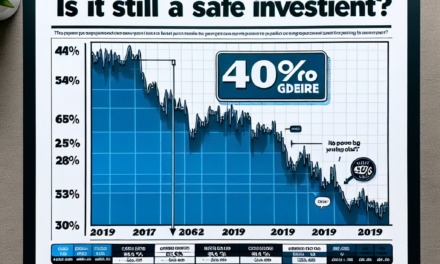“HCA Healthcare Q3: Revenue and Profit Miss Marks, Storm Clouds Loom Over Future Growth”
Introduction
HCA Healthcare’s third-quarter earnings report reveals a challenging period for the healthcare giant, as both revenue and profit figures fell short of expectations. The company faced a confluence of operational hurdles, including increased labor costs and supply chain disruptions, which contributed to the underwhelming financial performance. Additionally, the recent impact of a major hurricane is anticipated to further strain HCA Healthcare’s growth prospects in the coming months. This natural disaster has not only disrupted services in affected regions but also poses ongoing challenges in terms of recovery and resource allocation, potentially hindering the company’s ability to rebound swiftly. As HCA Healthcare navigates these adversities, stakeholders are closely monitoring its strategic responses to mitigate the financial and operational impacts while striving to restore growth momentum.
Analysis Of HCA Healthcare’s Q3 Earnings: Revenue And Profit Shortfall
In the third quarter of 2023, HCA Healthcare, one of the largest healthcare service providers in the United States, reported earnings that fell short of market expectations, both in terms of revenue and profit. This shortfall has raised concerns among investors and analysts, as the company navigates a challenging economic environment compounded by natural disasters. The financial results for this quarter reveal a complex interplay of factors that have impacted HCA Healthcare’s performance, and understanding these elements is crucial for anticipating the company’s future trajectory.
To begin with, HCA Healthcare’s revenue for the third quarter was below projections, marking a significant deviation from the growth trajectory observed in previous quarters. This decline can be attributed to several factors, including a decrease in patient volumes and a shift in the payer mix. The ongoing economic uncertainty has led to a cautious approach among patients, resulting in postponed elective procedures and a general decline in hospital visits. Additionally, changes in the payer mix, with a higher proportion of patients relying on government programs such as Medicare and Medicaid, have exerted downward pressure on revenue, given the lower reimbursement rates associated with these programs.
Moreover, the company’s profit margins have been adversely affected by rising operational costs. Labor expenses, in particular, have surged as HCA Healthcare grapples with a nationwide shortage of healthcare professionals. The need to offer competitive wages and benefits to attract and retain staff has significantly increased the company’s expenditure. Furthermore, supply chain disruptions have led to higher costs for medical supplies and equipment, further squeezing profit margins. These challenges underscore the broader issues facing the healthcare industry, as providers strive to balance quality care with financial sustainability.
In addition to these immediate concerns, HCA Healthcare’s future growth prospects are likely to be influenced by the impact of recent natural disasters, most notably Hurricane Idalia. The hurricane, which struck several states where HCA operates, has caused significant damage to infrastructure and disrupted healthcare services. The immediate aftermath of the hurricane has necessitated substantial investments in repairs and recovery efforts, diverting resources that could have been allocated to growth initiatives. Moreover, the long-term effects of such natural disasters, including population displacement and economic disruption, may further complicate the company’s growth strategy.
Despite these challenges, HCA Healthcare remains committed to its strategic priorities, which include expanding its network of facilities and enhancing its digital health capabilities. The company has been investing in telehealth services and other digital platforms to improve patient access and streamline operations. These initiatives are expected to play a crucial role in driving future growth, particularly as the healthcare landscape continues to evolve in response to technological advancements and changing patient preferences.
In conclusion, HCA Healthcare’s third-quarter earnings report highlights a period of financial strain, driven by a combination of declining patient volumes, rising operational costs, and the impact of natural disasters. While these challenges present significant hurdles, the company’s strategic focus on digital health and network expansion offers a pathway to recovery and growth. As HCA Healthcare navigates this complex environment, its ability to adapt and innovate will be key to overcoming current obstacles and achieving long-term success. Investors and stakeholders will be closely monitoring the company’s efforts to address these issues and capitalize on emerging opportunities in the healthcare sector.
Impact Of Natural Disasters On HCA Healthcare’s Financial Performance
HCA Healthcare’s third-quarter earnings report has revealed a concerning trend for the healthcare giant, as both revenue and profit have fallen short of expectations. This financial shortfall is attributed to a variety of factors, with natural disasters playing a significant role in shaping the company’s current and future financial landscape. As the healthcare industry grapples with the challenges posed by environmental disruptions, HCA Healthcare’s experience serves as a poignant example of the broader impact of natural disasters on financial performance.
In the third quarter, HCA Healthcare reported a decline in revenue and profit, a deviation from the growth trajectory that the company had previously enjoyed. Analysts had anticipated stronger financial results, but the reality was tempered by unforeseen circumstances. One of the primary contributors to this downturn was the series of natural disasters that have recently affected various regions where HCA operates. Hurricanes, in particular, have had a profound impact on the company’s operations, disrupting services and leading to increased costs.
The recent hurricane season has been particularly severe, with storms causing widespread damage and necessitating the temporary closure of several HCA facilities. These closures not only resulted in a loss of revenue from halted operations but also incurred additional expenses related to repairs and recovery efforts. Furthermore, the displacement of patients and staff during these events added another layer of complexity to the company’s operational challenges. As a result, HCA Healthcare faced a dual financial burden: the immediate loss of income and the long-term costs associated with rebuilding and fortifying its infrastructure against future disasters.
Moreover, the impact of natural disasters extends beyond the immediate financial implications. The disruption of healthcare services during such events can lead to a loss of trust among patients, who may seek alternative providers in the aftermath. This potential shift in patient loyalty poses a risk to HCA’s market share and could further affect its financial performance in the coming quarters. Additionally, the increased frequency and intensity of natural disasters raise questions about the sustainability of current business models in the healthcare sector, prompting companies like HCA to reassess their strategies for resilience and adaptation.
Looking ahead, HCA Healthcare must navigate the challenges posed by natural disasters with a strategic approach that balances immediate recovery efforts with long-term planning. This includes investing in infrastructure improvements to enhance the resilience of its facilities, as well as developing comprehensive disaster response plans to minimize service disruptions. By proactively addressing these issues, HCA can mitigate the financial impact of future natural disasters and safeguard its position in the healthcare market.
In conclusion, the recent financial performance of HCA Healthcare underscores the significant impact that natural disasters can have on the healthcare industry. As environmental challenges continue to evolve, companies must adapt to ensure their financial stability and operational continuity. HCA’s experience serves as a reminder of the importance of resilience and strategic planning in the face of natural disasters, highlighting the need for healthcare providers to prioritize both immediate recovery and long-term sustainability. As the company works to overcome these challenges, its efforts will likely serve as a model for others in the industry, illustrating the critical role of preparedness in navigating the complexities of an increasingly unpredictable world.
Strategies For HCA Healthcare To Mitigate Future Growth Challenges
HCA Healthcare’s recent third-quarter earnings report has revealed a concerning trend for the healthcare giant, as both revenue and profit have fallen short of expectations. This underperformance has been attributed to a variety of factors, including operational challenges and external pressures. As the company navigates these turbulent waters, it is imperative to explore strategies that could mitigate future growth challenges, particularly in light of the anticipated impact of recent hurricanes on their operations.
To begin with, HCA Healthcare must enhance its operational efficiency to counteract the financial shortfalls experienced in the third quarter. Streamlining processes and reducing unnecessary expenditures can help the company maintain a healthier bottom line. By investing in advanced healthcare technologies, such as electronic health records and telemedicine platforms, HCA can improve patient care while simultaneously reducing costs. These technologies not only enhance the patient experience but also allow for more efficient resource allocation, which is crucial in times of financial strain.
Moreover, diversifying revenue streams could serve as a buffer against future economic uncertainties. HCA Healthcare could explore partnerships with other healthcare providers or invest in outpatient services, which have been growing in demand. By expanding its service offerings beyond traditional hospital care, HCA can tap into new markets and reduce its reliance on inpatient services, which are often more susceptible to economic fluctuations.
In addition to operational improvements and diversification, HCA Healthcare should also focus on strengthening its disaster preparedness and response strategies. The recent hurricanes have underscored the vulnerability of healthcare facilities to natural disasters, which can disrupt operations and lead to significant financial losses. By investing in infrastructure improvements and developing comprehensive emergency response plans, HCA can better protect its assets and ensure continuity of care during such events. This proactive approach not only safeguards the company’s financial health but also reinforces its commitment to patient safety and community support.
Furthermore, HCA Healthcare can benefit from fostering a culture of innovation within the organization. Encouraging employees to contribute ideas and solutions can lead to the development of new services and operational improvements. By creating an environment where innovation is valued and rewarded, HCA can stay ahead of industry trends and adapt more quickly to changing market conditions. This adaptability is crucial in an industry that is constantly evolving due to technological advancements and regulatory changes.
Additionally, HCA Healthcare should prioritize building strong relationships with stakeholders, including patients, employees, and the communities it serves. Transparent communication and collaboration with these groups can enhance trust and loyalty, which are vital for long-term success. Engaging with local communities through health education programs and partnerships can also strengthen HCA’s reputation and foster goodwill, which can be invaluable during challenging times.
In conclusion, while HCA Healthcare’s third-quarter earnings report has highlighted significant challenges, there are several strategies the company can employ to mitigate future growth obstacles. By focusing on operational efficiency, diversifying revenue streams, enhancing disaster preparedness, fostering innovation, and building strong stakeholder relationships, HCA can position itself for sustainable growth despite the uncertainties ahead. As the healthcare landscape continues to evolve, these strategies will be essential for HCA to maintain its leadership position and continue delivering high-quality care to its patients.
Understanding The Revenue Decline In HCA Healthcare’s Q3 Report

In the third quarter of 2023, HCA Healthcare, one of the largest healthcare service providers in the United States, reported earnings that fell short of market expectations. This underperformance has raised concerns among investors and analysts, prompting a closer examination of the factors contributing to the decline in revenue and profit. The company’s financial results were influenced by a combination of internal challenges and external pressures, which together painted a complex picture of the current healthcare landscape.
To begin with, HCA Healthcare’s revenue decline can be attributed to several key factors. One significant issue was the reduction in patient volumes across its network of hospitals and outpatient facilities. This decrease in patient numbers was partly due to a shift in consumer behavior, as more individuals opted for telehealth services and outpatient care, reducing the need for traditional hospital visits. Additionally, the lingering effects of the COVID-19 pandemic have continued to disrupt healthcare operations, with many patients delaying elective procedures and non-urgent medical treatments. This trend has had a direct impact on HCA’s revenue streams, as elective procedures typically generate higher margins for healthcare providers.
Moreover, the financial performance of HCA Healthcare was further hampered by rising operational costs. The healthcare industry has been grappling with increased labor expenses, driven by a nationwide shortage of healthcare professionals and the need to offer competitive wages to attract and retain staff. This labor shortage has been exacerbated by burnout and turnover among healthcare workers, leading to higher recruitment and training costs. Consequently, these increased expenses have put pressure on HCA’s profit margins, contributing to the overall decline in earnings.
In addition to these internal challenges, HCA Healthcare’s future growth prospects have been clouded by external factors, most notably the impact of natural disasters. The recent hurricane season has been particularly severe, with several storms causing significant damage to healthcare facilities in affected regions. HCA, with its extensive network of hospitals in hurricane-prone areas, has not been immune to these disruptions. The damage caused by hurricanes has led to temporary closures of some facilities, resulting in lost revenue and increased repair and recovery costs. As a result, the company has had to allocate resources to address these immediate concerns, potentially diverting attention from long-term growth initiatives.
Looking ahead, HCA Healthcare faces the challenge of navigating these complex issues while striving to maintain its position as a leading healthcare provider. The company will need to adapt to changing patient preferences by expanding its telehealth and outpatient services, ensuring that it remains competitive in an evolving market. Additionally, addressing the labor shortage will be crucial, requiring strategic investments in workforce development and retention programs. Furthermore, HCA must enhance its disaster preparedness and response strategies to mitigate the impact of future natural disasters on its operations.
In conclusion, HCA Healthcare’s third-quarter earnings report highlights the multifaceted challenges facing the healthcare industry today. The decline in revenue and profit underscores the need for healthcare providers to adapt to changing market dynamics and external pressures. By addressing these challenges head-on, HCA Healthcare can position itself for sustainable growth and continue to deliver high-quality care to its patients. As the company navigates this complex landscape, its ability to innovate and respond to emerging trends will be key to its future success.
The Role Of Hurricanes In Shaping HCA Healthcare’s Future Growth
HCA Healthcare, a prominent player in the American healthcare sector, recently reported its third-quarter earnings, revealing a shortfall in both revenue and profit expectations. This development has sparked discussions about the factors influencing the company’s financial performance and its future growth trajectory. Among these factors, the impact of hurricanes, particularly in regions where HCA Healthcare operates, has emerged as a significant consideration.
The third-quarter earnings report indicated that HCA Healthcare’s revenue and profit did not meet analysts’ expectations. This shortfall can be attributed to several factors, including increased operational costs and a challenging economic environment. However, a less obvious yet crucial element affecting the company’s performance is the occurrence of hurricanes, which have historically disrupted healthcare services and infrastructure in affected areas.
Hurricanes pose a unique challenge to healthcare providers like HCA Healthcare. These natural disasters can lead to temporary closures of facilities, damage to infrastructure, and disruptions in the supply chain. Consequently, the financial impact of hurricanes can be substantial, affecting both immediate revenue and long-term growth prospects. As HCA Healthcare operates numerous facilities in hurricane-prone regions, the company is particularly vulnerable to these disruptions.
In the aftermath of a hurricane, healthcare facilities often face increased demand for services due to injuries and health complications arising from the disaster. While this surge in demand might seem beneficial from a revenue perspective, it also strains resources and requires significant investment in repairs and staffing. Moreover, the unpredictability of hurricanes makes it challenging for healthcare providers to plan and allocate resources effectively, further complicating their financial outlook.
Looking ahead, the potential for future hurricanes to affect HCA Healthcare’s growth cannot be underestimated. Climate change has been linked to an increase in the frequency and intensity of hurricanes, suggesting that the company may face more frequent disruptions in the coming years. This possibility necessitates a strategic approach to mitigate the impact of such events on the company’s operations and financial performance.
To address these challenges, HCA Healthcare may need to invest in infrastructure improvements and disaster preparedness measures. Strengthening facilities to withstand severe weather conditions and developing comprehensive emergency response plans could help minimize the impact of hurricanes on operations. Additionally, diversifying the geographic distribution of facilities might reduce the company’s exposure to hurricane-related disruptions.
Furthermore, collaboration with local and federal agencies can enhance HCA Healthcare’s ability to respond effectively to hurricanes. By working closely with emergency management organizations, the company can ensure that it is better prepared to handle the aftermath of such events, thereby safeguarding both its financial stability and its ability to provide essential healthcare services.
In conclusion, while HCA Healthcare’s third-quarter earnings report highlighted a shortfall in revenue and profit, it also underscored the significant role that hurricanes play in shaping the company’s future growth. As climate change continues to influence weather patterns, the potential for increased hurricane activity presents both challenges and opportunities for HCA Healthcare. By adopting a proactive approach to disaster preparedness and infrastructure resilience, the company can better navigate the uncertainties posed by these natural disasters, ultimately securing its position as a leading healthcare provider in the United States.
Financial Implications Of HCA Healthcare’s Q3 Earnings Miss
HCA Healthcare’s third-quarter earnings report has revealed a notable shortfall in both revenue and profit, raising concerns about the financial trajectory of one of the largest healthcare providers in the United States. The company’s performance in this quarter has been closely scrutinized by investors and analysts alike, as it provides critical insights into the operational challenges and market dynamics currently facing the healthcare sector. As the financial figures were unveiled, it became evident that HCA Healthcare’s revenue and profit did not meet the expectations set by market analysts, prompting a reevaluation of its growth prospects.
The third-quarter earnings report indicated that HCA Healthcare’s revenue fell short of projections, a development that can be attributed to several factors. One significant element contributing to this shortfall is the ongoing pressure on hospital operations, which has been exacerbated by fluctuating patient volumes and rising operational costs. The healthcare industry has been grappling with these challenges for some time, and HCA Healthcare is no exception. The company’s ability to manage these pressures effectively is crucial for maintaining its financial health and ensuring sustainable growth.
Moreover, the profit margins for HCA Healthcare have also been impacted, reflecting the broader economic environment and the specific challenges within the healthcare sector. The rising costs of labor and supplies have put additional strain on the company’s profitability. As healthcare providers continue to navigate these financial headwinds, the importance of strategic cost management and operational efficiency becomes increasingly apparent. HCA Healthcare’s efforts to address these issues will be pivotal in determining its future financial performance.
In addition to the immediate financial implications of the third-quarter earnings miss, HCA Healthcare is also facing potential challenges in the near future due to the impact of recent hurricanes. Natural disasters have historically posed significant disruptions to healthcare operations, affecting everything from patient care to facility management. The recent hurricane activity is expected to have a lingering effect on HCA Healthcare’s operations, potentially hindering its growth prospects in the coming quarters. The company will need to implement robust contingency plans and recovery strategies to mitigate the impact of these natural events on its financial performance.
Furthermore, the broader economic landscape continues to influence HCA Healthcare’s financial outlook. The healthcare sector is not immune to macroeconomic factors such as inflation and changes in government policy, which can have far-reaching effects on revenue streams and cost structures. As HCA Healthcare navigates these complexities, its ability to adapt to changing market conditions will be a key determinant of its long-term success.
In conclusion, HCA Healthcare’s third-quarter earnings report has highlighted several financial challenges that the company must address to ensure its continued growth and stability. The shortfall in revenue and profit underscores the need for strategic adjustments in response to both internal and external pressures. Additionally, the anticipated impact of recent hurricanes adds another layer of complexity to the company’s financial outlook. As HCA Healthcare moves forward, its focus on operational efficiency, cost management, and strategic planning will be essential in overcoming these challenges and achieving sustainable growth in an ever-evolving healthcare landscape.
Evaluating HCA Healthcare’s Response To Environmental Disruptions
In the third quarter of 2023, HCA Healthcare faced a challenging financial landscape, as evidenced by its earnings report which revealed both revenue and profit figures falling short of expectations. This underperformance can be attributed to a confluence of factors, with environmental disruptions playing a significant role. As the healthcare giant navigates these turbulent times, it becomes imperative to evaluate its response to such disruptions and the potential impact on future growth.
The recent earnings report highlighted a decline in revenue, which can be partially attributed to the aftermath of a severe hurricane that struck key operational regions. This natural disaster not only disrupted healthcare services but also led to increased operational costs, as facilities were forced to implement emergency protocols and repairs. Consequently, the financial strain was evident in the reduced profit margins reported for the quarter. While HCA Healthcare has historically demonstrated resilience in the face of environmental challenges, the frequency and intensity of such events necessitate a more robust strategic response.
In addressing these environmental disruptions, HCA Healthcare has taken several proactive measures. The company has invested in strengthening the infrastructure of its facilities, ensuring they are better equipped to withstand natural disasters. This includes upgrading building materials, enhancing flood defenses, and installing backup power systems to maintain operations during outages. Furthermore, HCA Healthcare has prioritized the development of comprehensive emergency response plans, which are regularly updated and tested to ensure readiness in the face of unforeseen events.
Despite these efforts, the recent hurricane has underscored the need for a more integrated approach to disaster management. HCA Healthcare is now exploring partnerships with local governments and emergency services to enhance coordination and resource allocation during crises. By fostering these collaborations, the company aims to minimize service disruptions and ensure the continuity of patient care, even in the most challenging circumstances.
Looking ahead, the impact of environmental disruptions on HCA Healthcare’s growth trajectory cannot be overlooked. The increasing frequency of such events poses a significant risk to the company’s operational stability and financial performance. As a result, HCA Healthcare is actively seeking to diversify its geographical footprint, reducing its reliance on regions prone to natural disasters. This strategic shift not only mitigates risk but also opens new avenues for growth in emerging markets.
Moreover, HCA Healthcare is investing in technology-driven solutions to enhance its resilience against environmental disruptions. The adoption of telemedicine and remote patient monitoring systems has enabled the company to maintain patient care services even when physical access to facilities is compromised. These innovations not only improve operational efficiency but also position HCA Healthcare as a leader in the evolving landscape of healthcare delivery.
In conclusion, while HCA Healthcare’s Q3 earnings report reflects the challenges posed by environmental disruptions, it also highlights the company’s commitment to addressing these issues head-on. Through infrastructure investments, strategic partnerships, and technological advancements, HCA Healthcare is laying the groundwork for a more resilient and sustainable future. As the company continues to adapt to the changing environmental landscape, its ability to effectively respond to such disruptions will be crucial in driving long-term growth and maintaining its position as a leader in the healthcare industry.
Q&A
1. **What were HCA Healthcare’s Q3 earnings results?**
HCA Healthcare reported Q3 earnings with revenue and profit falling short of expectations.
2. **How did HCA Healthcare’s revenue perform in Q3?**
The revenue for HCA Healthcare in Q3 was below analysts’ expectations.
3. **What was the impact on HCA Healthcare’s profit in Q3?**
HCA Healthcare’s profit in Q3 also fell short of projections.
4. **What external factor is expected to affect HCA Healthcare’s future growth?**
A hurricane is anticipated to impact HCA Healthcare’s future growth.
5. **How did the market react to HCA Healthcare’s Q3 earnings report?**
The market reaction was likely negative due to the earnings and profit shortfall.
6. **What specific challenges did HCA Healthcare face in Q3?**
HCA Healthcare faced challenges related to lower-than-expected revenue and profit.
7. **What are the future growth concerns for HCA Healthcare?**
Future growth concerns for HCA Healthcare include the anticipated effects of a hurricane.
Conclusion
HCA Healthcare’s Q3 earnings report revealed a decline in both revenue and profit, failing to meet market expectations. The shortfall can be attributed to various operational challenges and increased expenses. Additionally, the impact of a recent hurricane is anticipated to further hinder future growth prospects, as it may lead to disruptions in service delivery and increased costs related to recovery and rebuilding efforts. This combination of factors suggests that HCA Healthcare may face continued financial pressures in the near term, necessitating strategic adjustments to navigate these challenges effectively.





